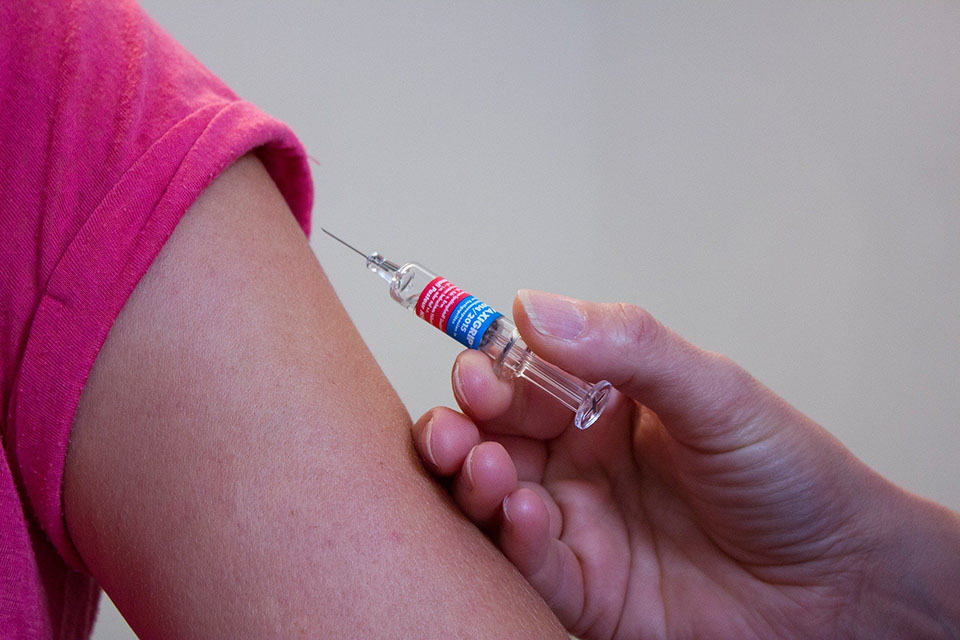Pharmacists: A New Partner in Childhood Immunizations
December 15, 2020 Cherokee Layson-Wolf, PharmD
Learn how community pharmacies help make it easier and more convenient than ever for children to receive their full schedule of lifesaving immunizations.
Editor’s Note: This blog post was co-authored with Deanna Tran, PharmD, BCACP, assistant professor in the Department of Pharmacy Practice and Science (PPS), and first published as an op-ed in The Baltimore Sun on October 27, 2020. It is republished here with permission from the authors. Readers are welcome to view the original article here.
The Department of Health and Human Services (DHHS) recently announced that pharmacists in all 50 states are now able to administer the full schedule of lifesaving immunizations for children ages 3 to 18. As immunizing pharmacists and faculty at the University of Maryland School of Pharmacy, we want parents and guardians to know that this authorization now makes it easier and more convenient than ever to keep your children up-to-date on these important vaccines — especially as we deal with the coronavirus pandemic.
Parents have had plenty to juggle during the coronavirus pandemic, including managing both the mental and physical health of their children. Fear and anxiety about the health implications of contracting the virus and the virtual format of most public schools in the spring and this fall have caused many Americans to forgo their usual preventive health care measures, including staying up to date on childhood immunizations.
Childhood immunization rates across the country have decreased dramatically since the pandemic’s onset. According to the Maryland Department of Health, in April 2020, the number of vaccine doses administered to children ages 0 to 18 years old in Maryland was down 56% compared to last year, causing a great deal of concern for our Maryland community.
Staying current on vaccines is vital to help keep the entire family healthy and can reduce additional visits to health care providers and hospitals, especially in the time of coronavirus. Being current on vaccines also prepares children to return to classrooms whenever schools can reopen. With pharmacists now able to provide the full schedule of childhood vaccines, parents now have more options for when and where to get vaccines, including their primary care provider’s office or their neighborhood pharmacy. Receiving immunizations at the pharmacy may be more convenient for busy parents. Nearly 90% of Americans live within five miles of a pharmacy. Additionally, pharmacies tend to stay open later and do not require an appointment to obtain immunizations.
Pharmacists in Maryland are trained and qualified to provide immunizations to both children and adults. We receive immunization training in pharmacy school, where students are required to complete at least 20 hours of education on vaccines, preventable diseases, and how to safely provide injections. Many pharmacists completed this training after graduation as well. Maryland law required immunizing pharmacists to complete four hours of immunization continuing education every two years, which exceeds the DHHS requirement of two hours.
Pharmacists have been immunizing in Maryland since 2005, with more than 4,800 pharmacists registered with the Maryland Board of Pharmacy to provide vaccinations. For more than 10 years, Maryland pharmacists have been providing flu vaccines to children 9 years old and up, as well as other vaccines to adults age 18 and up. Last week, DHHS expanded vaccination authority to also include pharmacy technicians and pharmacy interns who meet training requirements to administer vaccines to those age 3 and up during this public health emergency.
Pharmacists and pharmacy staff are working with other health care professionals to increase immunization rates. To ensure proper communication with a patient’s primary care provider, pharmacists already report administered vaccines to Immunet, Maryland’s immunization registry that can be accessed by health care providers. Pharmacists are also now required to remind parents and caregivers about the importance of child wellness visits and to refer patients for follow up visits back to their family physicians and pediatricians for additional care. We also can help families who don’t have a medical home — a term indicating that a patient has a regular physician they receive care from — find one.
With this recent expansion of ages where Maryland pharmacists may immunize, now more than ever pharmacists are important partners with families and our communities to keep our kids healthy.